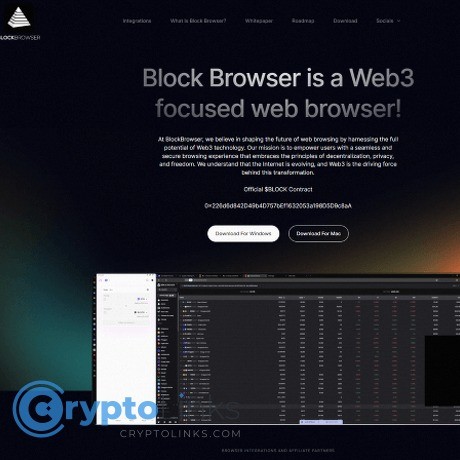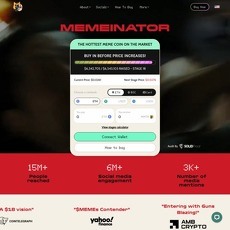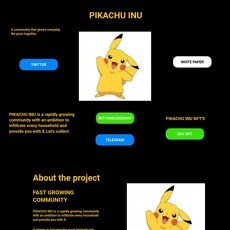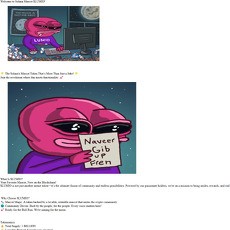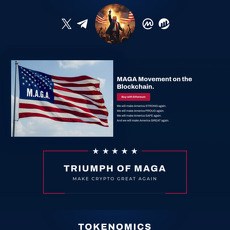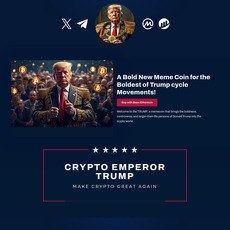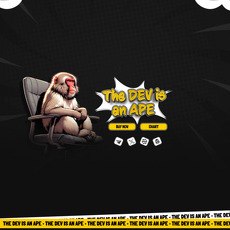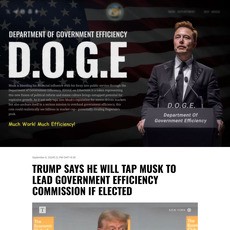Block Browser Review
Block Browser
blockbrowser.io
If your website is on the scam list and you think that you are not a scammer, contact us. After you provide us with all the proof that you are in Crypto World with good intentions, we will delist you. Usually, you get in this category because you are hiding your team, you have a bad reputation(you are tricking, deceiving, scamming people), and you haven't got a written project whitepaper or is a shitty one....
Their Official site text:
Welcome to BlockBrowser
Whitepaper and Roadmap
Overview
Block Browser - The All-in-One Browser to Crypto & Web3
Introduction
Cryptocurrency and DeFi (decentralized finance) have exploded in popularity, but the user experience remains fragmented across exchanges, wallets, data sites, communities and applications. This creates friction through constant context switching and tab overload.
Block Browser solves this by converging the essential crypto tools traders, investors, and builders need into one cohesive web browser. It streamlines decentralized finance and enables simpler access to the expanding blockchain ecosystem.
By integrating key trading, transaction, social, analytics, news, portfolio, and wallet features natively into one Web3-focused browser, Block Browser becomes the command center for all things crypto and defi.
This whitepaper outlines Block Browser's vision, architecture, key capabilities, tokenomics, competitive landscape, technical considerations, business model, roadmap, and future ambitions in detail.
Quick links
We've put together some helpful guides for you to get setup with our product quickly and easily.
What is Block Browser?
Block Browser aims to be the one-stop solution for cryptocurrency traders, investors, and DeFi users by combining essential tools into a single Web3-focused browser.
The key pain point it addresses is tab overload. Heavy cryptocurrency users often have dozens of tabs open across exchanges, wallets, on-chain analytics, charts, communities, and DeFi apps. This creates a fragmented workflow. Block Browser consolidates the most important tools into an integrated browser tailored for digital asset users.
Block Browser aims to consolidate the fragmented world of cryptocurrency trading and decentralized finance into one seamless web3 hub. The existing workflow for heavy crypto users suffers from severe tab overload, constant context switching, and a lack of cohesion. Block Browser tackles this head on.
At the core, Block Browser integrates the essential trading, transaction, portfolio management, news, data analytics, and community features crypto users depend on. Rather than bouncing between dozens of sites and tools, everything is accessible in one unified browser environment.
For traders, this means an advanced trading terminal for technical analysis, charting, backtesting strategies, and paper trading is built right in. Execute live trades through API connections to any exchange, all without leaving the browser.
Block Browser also shines for decentralized finance users. It offers multi-wallet management, cross-chain interoperability, integrated DeFi protocols and dApps, yield farming trackers, lending/borrowing services, prediction markets, launchpad trackers, and more.
The NFT module allows browsing collections, checking rankings and rarity, viewing 3D NFT models, and buying/bidding through integrated marketplaces. See your full NFT portfolio across wallets and chains in one dashboard.
In essence, Block Browser becomes the command center for all things crypto and defi. No more hopping around to access features. Everything is there in one cohesive experience.
This includes crypto news aggregation, sentiment trackers, event calendars, universal search, wallet activity feeds, airdrop management, staking overviews, and robust charting. Customizable layouts and menus allow tailoring the browser to specific workflows.
Underneath, Block Browser leverages speed, security, and modular architecture. It retains Chrome's extension ecosystem while moving towards web3 integrations. User preferences and data are decentralized via IPFS and Filecoin.
The goal is frictionless access to the rapidly expanding blockchain ecosystem. As crypto growth continues, Block Browser wants to be the portal through which the next generation of traders, investors, and builders experience web3.
What is Block Browser aiming to solve?
Problem Statement
Cryptocurrency enthusiasts today depend on a myriad of platforms and sites for trading, researching projects, interacting with communities, managing wallets, tracking portfolios, accessing data, and engaging with decentralized apps.
Juggling so many disconnected tools leads to an inefficient workflow plagued by:
Tab overload from keeping dozens of sites and apps open simultaneously. Power users may have 100+ tabs open across exchanges, wallets, NFT platforms, DeFi apps, market data sites, news aggregators, blockchain explorers, communities, and more.
Constant context switching when bouncing back and forth between exchanges, wallets, charts, communities, DeFi platforms etc. This constant task switching is distracting and breaks user focus and workflow.
Multiple fragmented sign-in points across the many services. Tracking numerous usernames and passwords creates friction.
Manually aggregating data from disparate sources. Pulling relevant on-chain data, transaction information, portfolio breakdowns, prices, and other intel across siloed platforms is tedious.
Privacy risks from scattering data and activities broadly across so many apps and sites. Users' trading patterns, holdings, and behaviors may be extracted and exploited when not contained securely.
This fragmentation friction will only increase as the blockchain ecosystem grows more sophisticated with more verticals, platforms and tools emerging in parallel. There is a clear need for a unified access point streamlining cryptocurrency and defi activity into one seamless user experience.
Block Browser Solution
Block Browser directly tackles the issues outlined above by providing an integrated browser-based command center converging the critical tools crypto/stock/forex power users rely on daily.
Rather than jumping around dozens of disconnected apps and sites, Block Browser allows conveniently managing trades, transactions, wallets, data analytics, communities, news discovery, asset tracking, DeFi platforms, NFTs, and more in one unified portal.
Key functionality spans:
Advanced Trading Terminal with live order execution, technical indicators, drawing tools, strategy backtesting and paper trading.
DeFi Suite seamlessly using leading lending, borrowing, staking, yield farming, decentralized exchanges, derivatives, asset management protocols, and other dApps.
NFT Gallery to explore, analyze, buy, bid on, mint, and manage non-fungible tokens across multiple blockchains.
Multi-Wallet Dashboard allowing users to connect, view, transact and switch between hardware cold storage wallets, software hot wallets, browser crypto wallets, and more in one simple interface.
Cross-Chain Interoperability with built-in bridges, swaps and functionality making asset movement between blockchains like Ethereum, BNB Chain, Solana, Cardano etc. straightforward.
Crypto Tax Planning tools integrated with leading tax platforms for seamless capital gains, losses, and income analysis of trading and DeFi activity across wallets, protocols and chains.
News Aggregator with customizable feeds curated from hundreds of industry news sources, projects, influencers, exchanges and more - all in one place rather than scattered tabs.
Social features like embedded Discord, Telegram, and crowdsourced sentiment tracking from crypto social media - eliminating tab overload.
Portfolio Tracker providing a consolidated view of profit/loss, asset allocation, exposures, risks, and other analytics across exchanges, wallets, chains, protocols, and NFTs.
Token Swaps facilitated through integrated decentralized exchanges that automatically aggregate liquidity and pricing across platforms like Uniswap, PancakeSwap, SushiSwap etc. to find optimal rates.
Blockchain/Protocol Analytics dashboards surfacing key data like transaction histories, wallet analysis, yield farm positions, governance situations, and other on-chain insights.
Universal Crypto Search engine indexing news, coin/token data, profiles, NFT collections, jobs, decentralized apps, protocols and more - providing a unified information portal for researching the crypto ecosystem.
Educational Modules tailored for newcomers in cryptocurrency and decentralized finance, providing guided tours, explainers, definitions, and resources.
And more to come...
By consolidating these interconnected capabilities into one unified browser environment, Block Browser offers a streamlined user experience and frictionless gateway into all facets of crypto and defi activity.
Architecture Overview
To provide a robust, adaptable platform for a broad range of functionality, Block Browser utilizes a modular, scalable architecture optimized for speed, reliability and security leveraging:
Chromium - High performance, cross platform web browser engine used in Chrome, Brave, Edge and other modern browser underpinnings. Chromium provides stability, speed and extension support core to Block Browser.
Rust - A modern systems programming language developed specifically for performance, security and memory safety. For key components like crypto currency modules, Rust's emphasis on thread safety and minimal runtime reduces vulnerabilities.
IPFS - The InterPlanetary File System is a distributed storage and computing platform that removes central points of failure. IPFS underpins Block Browser's decentralized storage of browser data like bookmarks and settings to avoid centralization risks.
Web3.js - A collection of libraries to interface with blockchain networks and wallet providers. Web3.js enables Block Browser's natively integrated wallet connectivity, cross-chain bridges, and other Web3 capabilities.
Cloudflare - A content delivery network and DDoS protection provider that helps offer fast, reliable access to Block Browser globally. Cloudflare also brings enhanced security and mitigation against various attack vectors.
Block Browser Features
Community Hub
Our integrated chat hub connects you to your favorite crypto communities right from the browser. With our embedded interfaces, you can monitor Telegram, Discord, and other community channels without ever leaving your window. See conversations and price charts side-by-side for seamless multitasking.
Telegram Integration - Message, follow channels and analyze Telegram communities through our embedded solution.
Telegram integration
Discord Integration - Join, chat and engage with Discord groups directly through our browser.
Discord Integration
Portfolio Tracker
Our portfolio tracker provides a comprehensive view of your crypto holdings in one place. By integrating with top providers like Zerion and CoinStats, we pull in real-time data across exchanges, chains, protocols and wallets. Get a bird's eye view of your profit/loss, asset allocation, and more.
Zerion Integration - Sync wallets and monitor balances across thousands of tokens.
Zerion Integration
Decentralized Exchange (DEX) Aggregator
Swap tokens and provide liquidity through our integrated DEX aggregator that sources liquidity from leading dexes like Uniswap. We find the best rates across multiple platforms so you can trade directly from the browser with minimal slippage.
Uniswap Integration - Access to automated liquidity pools with low fees.
Uniswap Integration
DeFi Suite
Access leading DeFi protocols and dApps directly within the browser. Our DeFi suite allows you to earn, borrow, lend, and manage tokens from an integrated portal.
Trading Terminal
Our advanced trading terminal has everything you need to chart, analyze and execute crypto trades without leaving the browser. An embedded TradingView charting module offers pro-level charting and technical analysis. Connect exchange API keys to trade from the charts.
TradingView Integration - Professional-grade charting and analysis tools.
TradingView integration
And many more integrations on the way including Coinstats, Moralis, DefiLlama, Dexscreener, Dextools, Etherscan, Twitch, YouTube, Netflix and more!
Tokenomics
$BLOCK is a ERC-20 token on Ethereum Chain
Token Supply and Distribution
The total supply of $BLOCK tokens is 1,000,000. This supply allows for ample distribution to early adopters and community members, while retaining value long-term as the project scales.
Taxes on Buys and Sells
To fund ongoing development, marketing, and operations for the $BLOCK ecosystem, a tax of 5% will be applied on all buy and sell transactions. This tax is broken down as follows:
2% Development Fund
These funds will support our team of developers to continue enhancing Block Browser and implementing new features. As our user base grows, we aim to rapidly roll out additional utility and functionality that improves the overall user experience.
2% Marketing Fund
Effective marketing is essential for building a thriving community around $BLOCK. These funds will be used for influencer partnerships, paid advertising campaigns, and other initiatives to spread awareness of our project.
1% Liquidity Fund
By adding liquidity, we can reduce price volatility and ensure market stability for $BLOCK. This tax will be used to support trading pairs on exchanges, as well as fund buybacks for earn-to-browse rewards.
We believe this tax breakdown allows for ample funding of our development roadmap, while retaining excellent tokenomics for holders long-term. With careful stewardship of these funds, we aim to accelerate the adoption and impact of $BLOCK.
How do Web Browsers Make Money?
Google Chrome:
Google Chrome displays advertisements through Google's extensive advertising network. Google leverages its massive data collection infrastructure to target relevant ads to Chrome users based on their interests and demographics. This contextual advertising model is a major revenue source for Chrome.
Google has access to significant user data from Chrome, including browsing history, search queries, and website interactions. This data allows Google to build detailed user profiles and segment audiences for highly targeted advertising campaigns. The data strengthens Google's dominance in digital advertising.
Google Chrome partners with major search engines around the world in lucrative referral deals. In most regions, Google Search is the default search provider in Chrome. This arrangement funnels valuable user traffic to Google Search, earning Chrome a cut of the search ad revenues.
Opera:
The Opera browser runs its own built-in advertising platform to show contextually relevant ads to users. Opera monetizes its user base by selling ad inventory to advertisers, earning a steady revenue stream.
Like other browsers, Opera also partners with search engines to channel search queries through them. Opera has agreements to make Yandex, Baidu and Google as default search options in different markets. This search syndication provides additional income for the browser.
Opera browser offers premium features like a VPN service, ad blocker, and other enhancements for a subscription fee. These optional upgrades are a way for Opera to earn revenues directly from its most engaged users.
Firefox:
Mozilla Firefox directs search traffic to partner search engines like Google, Yandex, Baidu and others based on region. These search partners pay Mozilla substantial fees for the referral traffic from Firefox searches.
Mozilla also receives donations from individual Firefox users and organizations. Though voluntary, these contributions provide meaningful revenue. Mozilla promotes donations and highlights its non-profit mission to encourage user support.
Mozilla is experimenting with new Web Monetization models like Coil, which lets users donate micropayments to support sites they visit through Firefox. This explores an alternative to ads.
Brave Browser:
Brave Browser shows privacy-focused ads that don't track users. This differentiated ad model allows Brave to earn ad revenues while protecting user data. Users get a share of ad revenue.
Users can opt into Brave's Basic Attention Token (BAT) rewards program to earn tokens for viewing ads. BAT creates an exchange value for user attention, rewarding engagement.
Brave Browser provides affiliate and referral commissions when users purchase products or sign up for services found via the browser. This gives users incentives to use Brave.
Brave offers a premium VPN service for a subscription fee, providing additional revenue beyond ads and commissions.
Alternative Revenue Streams:
Mozilla pioneered experiments with Web Monetization through Coil, letting users stream micropayments to sites they visit and value. This path could reduce reliance on ads.
Mozilla participates in the Grant for the Web initiative, which provides funding for projects serving the open web. This brings in revenue for Mozilla's work.
Mozilla's Data Futures Lab explores ethical data stewardship models for economic sustainability, outside of ads. This research could yield new monetization ideas.
Mozilla advocates for transparency and accountability in digital advertising. Though not directly revenue-generating, this supports Mozilla's goals.
Latest Developments:
Web3 models like crypto payments and NFTs are seeing expanded mainstream adoption, opening new revenue possibilities for browsers.
Major companies like Starbucks are starting to explore how they can incorporate Web3 technology like NFTs into their businesses.
Analysts forecast strong growth for the global Web3 market in 2023 as both companies and consumers show increasing interest.
Groups like the World Economic Forum and the Centre for the Fourth Industrial Revolution UAE actively promote blockchain technology and provide thought leadership.
BlockBrowser Business Model
Affiliate Programs
A core part of our strategy will be developing affiliate and revenue sharing partnerships with major players across the Web3 ecosystem. As a specialist browser for decentralized apps, crypto wallets, NFTs, metaverses and more, Block Browser will implement revenue sharing agreements with leading projects in each category. When our users engage with partner services, both parties benefit.
We will reach out to top crypto protocols, wallets, NFT platforms, metaverse worlds, decentralized social networks, AI chatbots, cloud storage systems, and any service relevant to our audience. Our team will handle partnership outreach and negotiations to construct deals that drive value on both sides.
Web3 Partner Program
Block Browser will implement an exclusive Web3 Partner Program for crypto/blockchain projects who want deep integration into the browser's dApp ecosystem. To join, partners will need to purchase a fixed number of tokens from Block Browser's supply and burn 1% of that purchase. This provides benefits like default placement in relevant galleries, shortcuts in the browser UI, cross-promotions to our user base, and more prime positioning.
The token burn counters inflation while financing growth. Our team will selectively curate partners so users only see the highest quality, most trusted services integrated natively into the browser. This provides our audience with a seamless Web3 experience while generating revenue.
Premium Memberships
For loyal users who want additional functionalities, premium memberships will provide exclusive tools, increased cloud storage, priority customer support, and other benefits beyond the base free browser. The mix of free and paid features allows us to monetize power users while keeping the platform accessible to mainstream audiences.
Cryptocurrency Rewards
To incentivize engagement, users can opt into our tokenized rewards system where they earn crypto for actions like participating in surveys, watching video ads, downloading new apps, referring friends, and more. Users will control their data sharing preferences. Partners get promoted to engaged users.
The combination of affiliate deals, premium subscriptions, Web3 partnerships, and incentivized engagement via crypto rewards provides diversified monetization while aligning with Web3 values. This will fund ongoing innovation.
Privacy Focused
In an age of widespread data harvesting, Block Browser aims to be a beacon for privacy on the internet. As a web browser built for the Web3 era, Block Browser is founded on the principles of user security, autonomy, and freedom. This starts with a strict no-logging policy to prevent user data collection in the first place.
Block Browser pledges not to track, store, or share any user browsing data without explicit consent. No search histories, website visits, clicks, or other sensitive information will be collected by default as users navigate the web. This departs drastically from mainstream browsers that amass enormous user profiles for advertising purposes.
To technically enforce privacy, Block Browser leverages encrypted DNS, disables analytics tracking, blocks third-party cookies by default, and removes embedded browser fingerprinting techniques used to identify users across the web. The browser sanitizes traffic to prevent surveillance.
For decentralized app access, Block Browser connects to dApps and blockchain networks in a secure masked manner that reveals no personal details. The team is also exploring integration of privacy-preserving technologies like zero-knowledge proofs and trusted execution environments.
While many claim privacy as a selling point, Block Browser intends to back it up mathematically through best-in-class encryption, network anonymity, on-device processing, and experimentally vetted techniques. Users finally have a browser designed from the ground up to protect them, not exploit them.
Transparency will be instrumental. Block Browser's codebase will be open-source to enable public audits and accountability. Bounty programs will encourage security researchers to stress test its privacy safeguards before public release.
The team firmly believes lack of privacy is a systemic issue facing internet users. Block Browser will demonstrate a viable alternative where people don't have to compromise between usability and personal data control. Its success will be measured by the new standard it sets for the industry.
Of course, users can optionally share data on their terms, like participating in crowdsourced threat reporting. But Block Browser's default position is minimizing data collection to what is strictly necessary for delivering service. The public's trust must be earned through actions, not platitudes.
By starting from principles first, Block Browser seeks to move the web forward. Its quest to empower users with privacy-first browsing reflects values becoming critical in the Web3 era. If pioneered responsibly, decentralization can rebalance power dynamics between individuals, governments and corporations. Block Browser embraces its role as an agent of digital rights. The future of privacy starts now.

